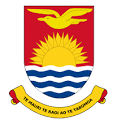ECD Project
1. Enhancing food security in the context of Global climate change (LDCF)
LDCF project is designed to build the adaptive capacity of vulnerable Kiribati Communities to ensure food security under conditions of Kiribati. The project worked collaboratively with relevant stakeholders such as Fisheries, Tourism, Lands, and Agriculture to explore opportunities to maximize availability of these resources to provide food to communities including training of community on techniques to improve capability of communities and ensure their easy access to resources and food supply.
2. SOLID WASTE MANAGEMENT PROJECT 2
The project continue what have been under Phase 1 with a focus on maintaining rubbish collection systems. This is done through provision of rubbish collection infrastructure required for collection and disposal of rubbish and there are also components done on awareness and training to promote community awareness on rubbish collection and proper disposal practises.
3. PACE-WASTE
The project promotes proper e-waste disposal management through promotional programs done with the community.
4. TURTLE MONITORING & ECO-TOURISM
This is part of the regional program funded by the SPREP involving monitoring of turtle species. The activities conducted in this program is tagging of turtles and training of ECD Officials on how to carry out turtle monitoring.
5. PERSISTENT ORGANIC POLLUTANT GLOBAL MONITORING PLAN (POP GMP)
The project implements the GMP for POPs according to article 16 of the Stockholm Convention on the effectiveness evaluation, by generating data on the concentrations of POPs in the core media human milk, air and water. The activities will strengthen the national capacity to implement the Global Monitoring Plan for POPs
6. SAICM II POST NATIONAL REPORT
The project aims to improve chemical and hazardous waste management. Part of the activities done under this project include; conduction of community awareness on hazardous waste management, data collection and recording, conduction of sampling and testing of chemical wastes.
7. BIENNUAL UPDATE REPORT TO UNFCCC
The objective of this project is to prepare and submit the Republic of Kiribati’s First Biennial Update Report (BUR 1) to fulfil its obligation under the UNFCCC (Article 12).
8. National E-Waste
The project is a regional project coordinated by SPREP and covered 3 PICs only namely Samoa, Cook Islands and Kiribati. The project was funded under the SAICM QSP (Quick Start Program) Trust Fund through SPREP. The project aims to develop the national capacity in the 3 islands to implement integrated and holistic management of imported Electric and Electronic Equipment (EEE) to ensure the sustainable management of their associated waste streams.
